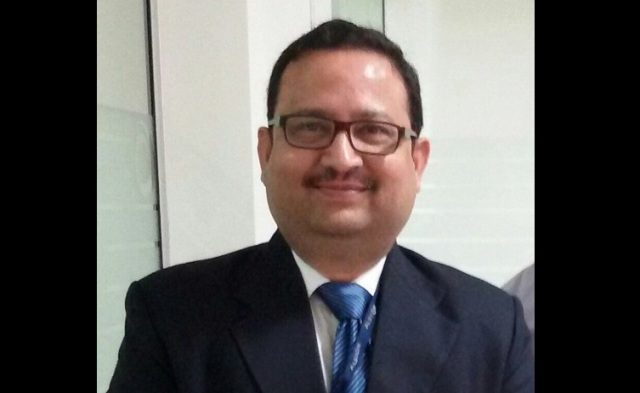An exclusive interview with SightsIn in November 2017, we had interaction with us Manish Gour. He is seasoned HR professional with rich experience of more than 30 years, someone who has developed good understanding to be able to run business operations. Through roles both strategic and operational, he has managed different lifecycles of businesses, transitions, projects and manufacturing. Having good exposure in the areas of Talent Management – Acquisition, Development, Education, Psychometrics, Employee Relations and Industrial Relations, Compensation & Benefits, HR Operations, Legal and Statutory, Administration, CSR etc.
Manish is currently associated with Alstom Transport India Ltd as Director, Human Resources, for Electric Locomotives Division (E-Loco), Non-Executive Director on the Alstom India Board, and Country Champion for CSR India and Lead responsible for Administration and Security functions for E-Loco. The E-loco division is a Rs. 25000 crore project in line with the Government’s prestigious MAKE IN INDIA initiative that requires delivering 800 electric locomotives out of our new factory in Madhepura, Bihar over an 11-year period. As of today, Alstom India employs around 3500 people across India.
Q-What are the challenges you think is prevailing within the HR department in the current situation?
Role of an HR department has evolved over the years. From a mere conventional service function, it has become an important strategic business partner playing a crucial role in the growth of an organization. The HR now comprehends and develops an understanding of the vision of the organization and works towards achieving the business goals. HR professionals need to be sensitive and alive to the dynamic market conditions; they should be able to change and adapt themselves. It’s a VUCA (volatility, uncertainty, complexity and ambiguity) world, wherein solutions are not permanent. Experience-sharing can only be reference points that need to be tweaked to adjust with individual organizational scenario. It is imperative that HR professionals live up to this new business expectation.
Q-What initiative(s) are you most excited about to ensure that the objectives of HR Department are fulfilled?
The need to align employees at large to understand what the organization needs to achieve in the short and long term, and what each employee’s role is in contributing to the larger vision, is an area of work that interests me. When executed well, you see everybody speaking the same language, fully-aligned towards individual and organizational objectives. There is a spark in the organization, a sense of pride and belongingness and the energy level of the people reach a new high. It is important to keep this spirit alive and consistent.
- It is the PEOPLE who build organizations. In pursuit of Business Excellence and Profits this fundamental understanding has to be maintained and its sight never lost.
- HR teams need to work around developing a good Talent Pipeline. High-performing and high-potential employees should be provided with a visible, achievable growth path in order to give them confidence in the organization and longevity.
- Diversity is a key ingredient in every organization of the present day. Every progressive organization should think beyond what already exists, and remain pro-active in introducing innovative ways of adopting diversity into its cultural framework.
Q-What are your views about Company Culture and how would you maintain it as Company grows?
Culture is a wide term that signifies the environment of work in an organization. It drives the unwritten principles that an organization follows, which then becomes a hallmark of an organization that employees depend upon formally/ informally. One needs to pick up the positive aspects of the existing culture and shred off the negativity. The depth of the organization’s culture should be propagated via employees and their actions.
Our organization is highly process oriented and places them on the topmost priority. They form our backbone and hold the organization upright during all peaks and troughs. Globally the organization speaks the same language and the understanding of all terms in the organization remains same everywhere. The organization has an extraordinary focus on EHS, Ethics and Compliance, CSR and Human rights and these elements are placed above all. At Alstom – TRUST, TEAM & ACTION are our core organizational values and PEOPLE are our priority.
Q-What can HR do to influence company culture?
Culture of an organization is a blend of acceptable actions, behaviors and thoughts that is designed to nurture a team that performs and brings in productive output to the table. I believe that HR has a strong role to play in creating and defining a company’s culture. An HR can strategize and facilitate actions to encourage employees to share their thoughts with openness, transparency and respect, thus, enabling people to form stronger teams.
HR is in a position to best understand all the underlining features of Culture in the organization, some of which are already shared with you now and could use promotional programs and tools to disseminate the same all across globally – uniformly. Research has proved that an employee feels most comfortable and at home/ ease in the organization when he understands and identifies himself with it. This also motivates him to have a longer association within the organization. The potential of an employee can then be exploited to its fullest potential.
Q-How do you ensure Gender Equality and women empowerment at workplace?
Globally, Alstom believes in gender equality and promotes diversity in the workplace. To this end, we have partnered with specialized organizations such as Elles Bougent in France, Valore in Italy, Women in Construction initiative in the UK for direction and guidance. In the USA, Alstom Women of Excellence (AWE) was created to empower women to grow into strong leaders and drive diversity. Gender equality at work is assured by not treating genders differently. This is applicable to all decisions across selection, hiring, performance, career growth, engagement, retention, compensation and rewards. If all genders are treated equally, then segregation in key decisions will not occur and this will ensure fairness across all genders.
It is now recognized organization-wide that women should be representing on key positions at the senior levels and campaigns are targeted in this direction without disturbing the internal balance. Bringing women at the fore of the organization will help promote women empowerment and strengthen base in long term.
Q- Organization culture also plays an important role in having better employee experience and employee satisfaction and also to have happy working environment. What are your views on the same?
My experience of over 30 years in this segment has taught me that engagement of an employee within the organization is the key motivator for him or her. However, certain attributes such as, work-life balance, opportunities to pursue additional interests, enhancement of academic knowledge, rewards, recognition and a supportive team structure are attributes that employees usually look out for. Every employee needs space and it is important that responsibility and empowerment are optimally available at all levels to pursue and perform. Often organizations tend to ignore this and become control-driven which discourages employees to perform to the best of their capabilities. An organization’s culture always travels top-down so it is imperative for the leadership to provide a direction to the organization and contribute directly to the happiness and satisfaction of an employee.
Q-What are the important elements to have diversity in organization?
Most important element to improve diversity in an organization is the leadership’s recognition and understanding of the need for diversity and a will to execute it. Diversity provides cultural dynamism and strengthens the organization.
Our consistent efforts in this direction are now visible in the remotest locations of the Organization Globally where it was difficult to dream of diversity making inroads.
Q-What steps has Alstom taken to ensure diversity in your organization?
The culture of diversity is a specific pillar of our strategy. While there is a general drive from the leadership at Alstom, a clear target for the business heads to achieve at least 25% of diversity in next one year’s time has been identified. Given the nature of our business being spread across multiple countries and hence embracing a plethora of cultures, it is important to expose and sensitize our employees to develop an inclusive environment. HR has also been working overtime to put into place policies which support flexibility to operate and create an atmosphere conducive to balancing work, children and home. The company’s regional organizations’ increasing thrust towards localization of projects and the drive to foster a closer relationship with customers all strengthen its cultural diversity.
Q-Would request you to mention some of the best HR practices of your company?
There are many and we have been awarded for some. Some noteworthy ones include:
- Performance appraisal and potential appraisal are key elements of our performance management process. We take this forward through a process called PEOPLE REVIEW which engages leaders to look at availability of Leaders, Talents, Critical Skills, Experts and availability of SUCCESSION for important positions in the organization. This also provides scope for reviewing availability of growth and development opportunities for Talents available in different businesses of the organization whether domestic or international.
- We have been extensively involved in connecting with the universities in the country and have a strong campus program. Under our Young Engineering Graduate Program (YEGP) we hire and train young talents (engineering graduates) in order to mould talent in-house.
- Earlier we were largely dependent on hiring through external agencies. Now we’ve adopted lateral hiring through Internal Mobility and Employee Reference programs. Portals and social media are secondary sources and external agency hiring is minimal.
- Annual Engagement Calendar has turned out to be a big stress buster and has provided space for employees and families to bond outside work and connect informally.
Q-Please name one HR initiative for which you were extremely excited to initiate and it was very successful in the organization?
Difficult to place my finger on one intervention. However, the ones that are closest to my heart are –
– VISION EXERCISE to build upon a long term strategy and its cascade across the organization using gaming theme, high impact to the last levels.
– CAPABILITY DEVELOPMENT to enhance potential of leadership team of an existing organization when modernization work was undertaken in the unit using an Integrated approach – Assessment tools, Training and Coaching and reflection v/s original capability.
– CHANGE MANAGEMENT during Merger & Acquisition with new organization, continuous sessions taken across businesses and locations
– Strong EMPLOYEE RELATIONS in a multi-unit and multi union scenario spanning over more than 10 years and 3 terms of agreements at the central level thereby creating an organizational climate boasting of trust, faith and transparency in employees and management in letter and spirit. The confidence and love of employees makes me still feel excited though I have moved.
– RESTRUCTURING in one of our business units where 90% of the employees were absorbed into another businesses within the organization and only few weaker employees had to be separated.
– Developing an ONLINE 360 degree appraisal tool INHOUSE with able support from my IT colleagues around year 2002 when only few organizations had manual intervention.
– The current E-LOCO PROJECT is also taking me through its thrills where we are dealing with a MAKE IN INDIA project in a difficult location installing a manufacturing unit.
Now, the company is committed to future-oriented concrete action in terms of our employees: junior training, working conditions for people with disabilities, long career and supporting older workers (internal mobility, cross sectors, etc.). The quality of our teams, their skills and their commitment are crucial to our overall success. I have been a part of driving change within the Indian work force towards achieving a healthier gender and cultural mix and this is something I will be proud of for a long time to come.
Q-What would be your advice for the HR beginners for their career?
All freshers should commit themselves to the function and should not be scared to get their hands dirty. Learning is derived out of an in-depth understanding of the role one needs to perform. If the base is strong, it is easy to build upon it. On-ground knowledge is the key to success and there is no substitute for it.
Q-What do think should be the indispensable qualities of a HR Leader?
Good attitude, respect for others and understanding that behind every professional there is a human being who needs to be understood and appreciated. Commitment, humility, patience, ability to listen, honesty, empathy, forgiveness, eagerness to help is some of very important behavioral traits for any HR person. If one keeps their mind open learning will automatically happen. All of these traits have supported me to sail through bumps, even navigate tough unions, during my career. In fact these people have remained connected with me and continue to respect me. All my colleagues – past / present feel free to reach out to me at any time. Finding the right solution is always important.
Q-What three experiences of yours would you recommend to an emerging HR leader who aspires to be in your shoes one day?
I feel one should:
- Work in a factory for a few years, people-learning there is immense
- Be open minded and positive
- Regularly introspect and learn from mistakes, learning should never stop.
Thank you Manish!









